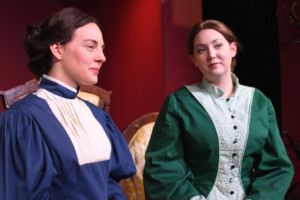Interview: Courtney Murphy of IN THE NEXT ROOM at Theatre Baton Rouge

It's not every day that sex toys will play any significance in Baton Rouge theatre, but in Sarah Ruhl's play, "IN THE NEXT ROOM, or the Vibrator Play" it's easy to see how its role is quite electric. Amid bawdy humor and clever double entendres is a brilliant play that peers into the scope of Victorian sexual dysfunction while also raising important questions about male-female relationships. BroadwayWorld.com got to sit down with actress Courtney Murphy of bringing this play to life on the Theatre Baton Rouge stage.
Bennett: Tell me about the show. What drew you to audition for it?
Murphy: When I was in college, I first read some plays by Sarah Ruhl, which this is one of them, and I just enjoyed at the time being in school and being a young woman and enjoyed seeing women who were portrayed as normal even if they have a lot going on in their lives. So, it was nice just to see this historical depiction of women who are maybe struggling against the status quo. They were these women with a very modern kind of thinking, but they were set in different time periods. She's a very good playwright. She writes very honestly very humorously but very beautifully at the same time. The words that she chooses to work with are just perfect and are succinct. She's a very good playwright; there's no other way to describe it. And that's always for me as an actor a huge thing that I look for that if the script is well-written then that immediately draws me to want to work on it. For this show I had the opportunity to read it and knew we were going to performing it during the season and thought to myself this could be an opportunity to get to work on a show by her that was always a little goal of mindset back in college.
Bennett: Tell me how your character grows in the show.
Murphy: Well, my character starts the show as being a patient of the doctor who is treating women for hysteria. Her growth as a character is very interesting. She's what you could consider a very loveless relationship with her husband and then through being treated for hysteria discovers she's missing out on a specific aspect of relations with her husband. Her journey is of discovering and owning her sexuality in a way but discovering it through a machine as opposed through other people is interesting. So, there's a growth of her character's reactions to what is happening to her physically that is very evident through the show. And by the end of it, she discovers something potentially about herself that she chooses to ignore, so it's almost as if my character doesn't necessarily grow by the end of it. She does grow throughout the process, but the realization she comes to she chooses to ignore and walk away.
Bennett: With it taking place in the tightly corseted Victorian era, how do you think the plot of the play and its characters can still relate to the modern day?
Murphy: So, I think it relates to the modern day because the conversations that each of these characters has are very relatable. If you took these people out of the costume...for example, Dr. Givings, the doctor who is treating the women with hysteria, and his wife are going through the fact that his wife can't feed their child from breast milk. So that's like a normal conversation that people could easily have in a modern time. There's a struggle with their marriage. All these very genuine topics of discussion are brought up throughout the course of this entire show. And that's what to me makes it so relatable on such a human level. I feel like if you come to see this show, you're going to hear possibly a conversation you've might have had with a partner or with someone you know in your life who have had struggles in their relationship or someone who is discovering a part of themselves through their sexuality and their identity. It's very human; it's such a human piece in my opinion.
Bennett: How has the experience of being in this show changed you as a person?
Murphy: I think probably the best way to explain it is that this show just reaffirms some ideas I have about how people react to intimacy and obstacles that they overcome to either obtain intimacy or the obstacles that they create unknowingly to achieve that intimacy as well. So, as a person, I guess it reaffirms some beliefs as well as opens my eyes to different points of view or perspectives.
Bennett: The script raises some interesting questions about technology. It's almost like this little piece of electricity is a kind of liberation almost.
Murphy: I think it's important that the show is set at the dawn of the 19th century when electricity was readily available to start a whole new age of everything. And I think the women in this show, you see the change in them themselves. By the end of it, one woman takes kind of control of her marriage, and it's almost like a bit of a sexual revolution for some of the women within the show. So that's cool that that is the spark that essentially starts the fire...That's all it takes is a natural movement to create another movement.
IN THE NEXT ROOM runs now through February 17th.
Videos
